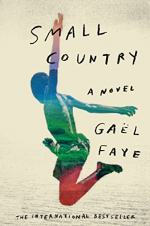|
This section contains 791 words (approx. 2 pages at 400 words per page) |

|
Small Country Summary & Study Guide Description
Small Country Summary & Study Guide includes comprehensive information and analysis to help you understand the book. This study guide contains the following sections:
This detailed literature summary also contains Quotes and a Free Quiz on Small Country by Gaël Faye.
This guide is based on the following version of the book: Gaël, Faye. Small Country. Hogarth: London, New York. Translated by Sarah Ardizzone. 2018.
Small Country is a novel told in the first person from the perspective of Gabriel, a young boy of French and Rwandan descent growing up in Burundi in the 1990s. In the section titled “Prologue,” Gabriel reflects on a moment in his childhood when his father tried to explain to him the differences between Hutus and Tutsis. The prologue is followed by a lyrical couple of pages, written in italics, in which the narrator, now in his thirties and living in France, thinks back to this time in his life. He drinks a lot and most of his social connection takes place online.
In the early chapters of the novel, a young Gabriel tries to make sense of his parents’ crumbling marriage. Though he hopes that his parents will get back together, it is clear that his Rwandan mother and French father have different priorities and visions for their lives: while Maman wants to move to France, where she hopes to get some security, Michel wants to stay in Burundi where he enjoys a more privileged lifestyle. After his parents separate, Gabriel’s father gives him a red BMX bike. The bike is stolen and Gabriel demands that it be returned to him, even though the return means taking the bike away from a poorer, less privileged child.
At his French school in Bujumbura, Gabriel begins corresponding with his new pen pal, a French girl named Laure. He tells Laure that he want to be a mechanic when he grows up. Maman takes Gabriel and his sister, Ana, to visit her family in Rwanda. Maman’s brother, Alphonse, has died fighting in the Rwandan National Front, and Pacifique is now planning to join. Whereas Maman, however, insists that her children are white and not Rwandan, both Pacifique and Rosalie, Gabriel’s great-grandmother, dream of returning to Rwanda.
Gabriel describes his friends, a group of boys in the neighborhood: Gino, Armand, the twins, and eventually, Francis. Though Francis, an older and poorer boy, is initially their enemy, he eventually becomes their de facto leader. Gino dreams of joining the Rwandan National Front, and the country has presidential elections. The more revolutionary candidate wins, only to be overthrown by the military in a coup d’etat. Gabriel celebrates his tenth birthday with family and friends. A neighbor’s horse escapes.
Gabriel travels with his family to Rwanda in February, in order to attend Pacifique’s wedding to his longtime girlfriend, Jeanne. They are met at the airport by Maman’s aunt, Aunt Eusébie. A widow, Aunt Eusébie raised her four children--Christelle, Christiane, Christian, and Christine--by herself. The wedding is rushed because Jeanne is pregnant and because war is approaching in Rwanda. En route to the wedding, Maman and Eusébie’s car is stopped and both women are sexually harassed by the policemen.
Back at home, Gino invites Francis into their group. One day, Francis takes the group, via taxi, to the college du Saint-Esprit, where they are not allowed. Francis shows off his backflips, and Gabriel is pressured into doing one of his own.
On April 7, 1994 both the presidents of Rwanda and Burundi are assassinated. Genocide begins and the family loses contact with Aunt Eusébie and Maman’s family. New security measures are put in place in Bujumbura, and Gabriel begins spending time at Madame Economopoulos’s house. When the violence finally stops, Maman heads to Rwanda, only to return months later, emaciated and unstable. She tells harrowing stories of violence, including the deaths of Gabriel’s four cousins.
As the violence encroaches upon even Gabriel’s protected neighborhood, the boys begin to talk about plans to defend their neighborhood. Francis and Gino involve the boys in a gang called “The Diehards.” They are shown a man lying on the ground. One of the gang members identifies the man as the Hutu who killed Armand’s father. The gang leader first tries to get Armand to light the man on fire. When Armand refuses, Innocent turns to Gabriel. Horrified, the world turns into a blur, and Gabriel tosses the lighter onto the man. Eventually, Gabriel and his sister are boarded onto a repatriation plane for French nationals. Two of the family servants are killed in the violence, as is Michel, Gabriel’s father.
In the final pages of the novel, 33-year-old Gabriel returns to Burundi to collect books that Madame Economopoulos has left for him. There, he meets with Armand, who takes him to see his mother. His mother does not recognize Gabriel, instead confusing him for his dead cousin, Christian.
Read more from the Study Guide
|
This section contains 791 words (approx. 2 pages at 400 words per page) |

|



